I can't stop watching this...
Monday, November 30, 2009
This is a newsletter written by one of our Pick a Pocket leaders Liz: NEW UPDATES FROM GARBAGE CITY! Click here to read :)
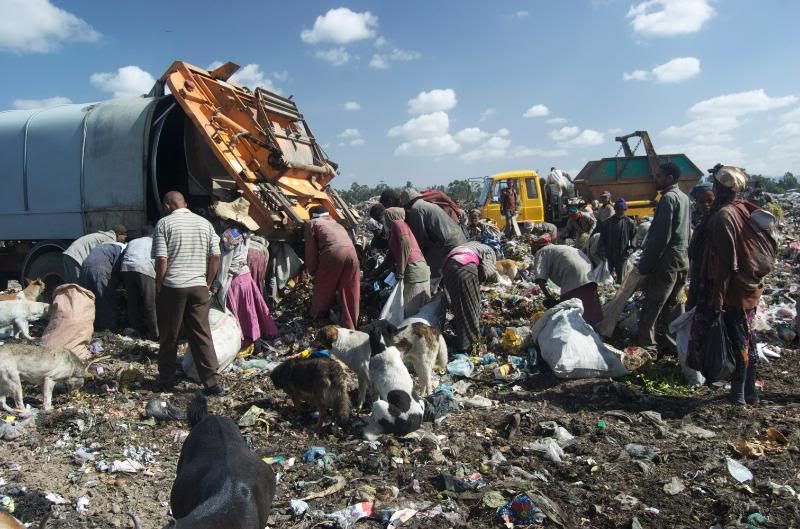
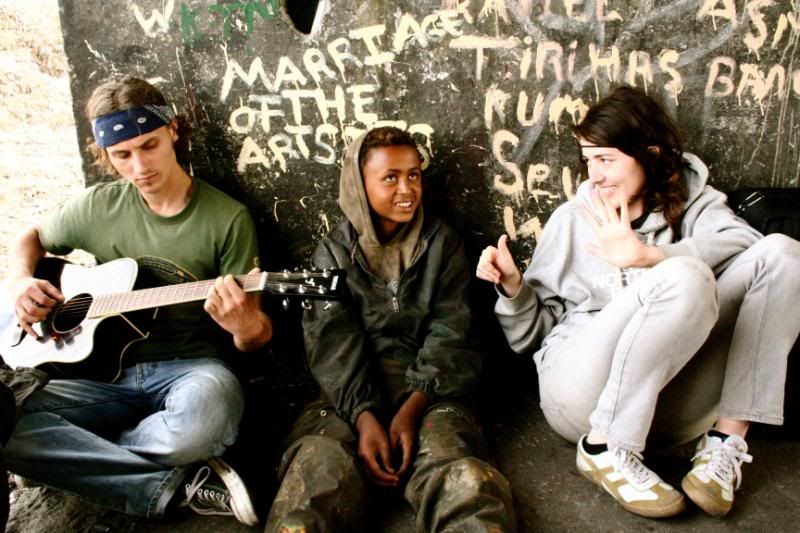
sleep over in the trash... burning all the trashed sandals to keep warm
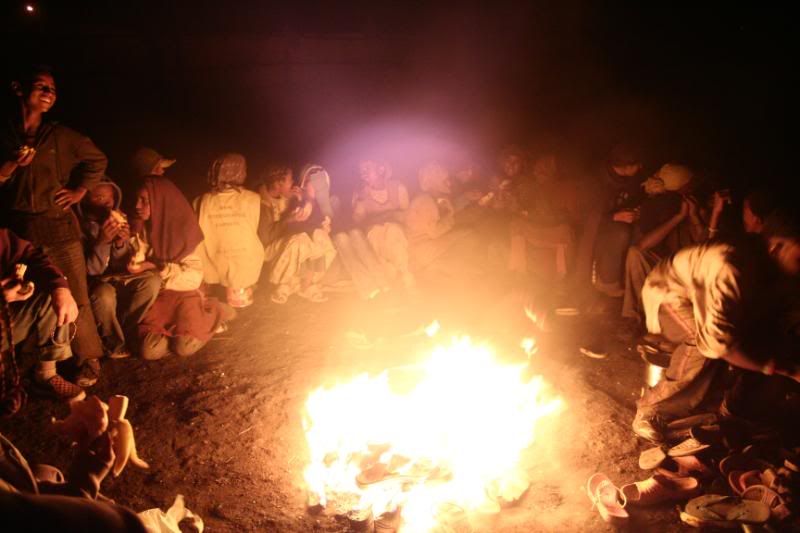
music dts playing for the kids
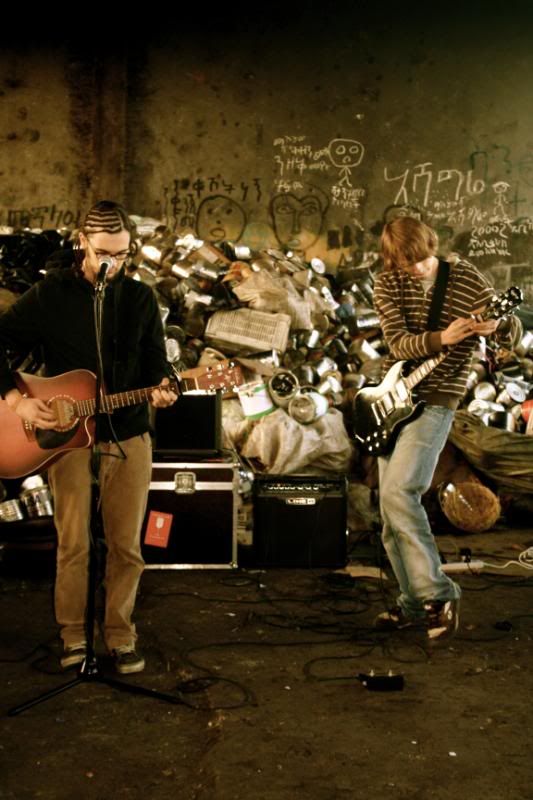


sleep over in the trash... burning all the trashed sandals to keep warm

music dts playing for the kids

Saturday, November 28, 2009
Friday, November 27, 2009
India
The red light area is home of millions of prostitutes as well as their children. We saw many of children who lived in the brothel rooms. There is no law in India that protects these children. Even though it is known that children living with their mothers in the brothel rooms are faced with abuse, there is no law that says that children should not be in the brothel rooms with their mothers. We are so thankful that Vera has such a huge heart for these children and has graciously given nine young girls another hope at life. I just pray that there will arise many more strong women like her in the near future.
Our role is to help the woman, the mothers, the sisters out of prostitution. But it is not easy to see the women leave this profession and come to an alternative life-style. There are reasons why they do not want to leave: 1) the younger women make a lot of money in this area. Why would they want to leave and get a low-paying job? (They can only get low-paying jobs as most of them have never been to school. 2) the older women want to leave as they now make very little money. But it is so hard to find them a place to live and a job without the skills. 3) they have had a very difficult past (being forced into prostitution). So even if they do come out, they are faced with so many addictions and trauma.
As we met with the nuns and Vera about the future “business plans” and introducing the second-hand shop idea. They were really into it and took it very seriously. We talked about what our next steps should be and deiced that we must first get people to commit long-term to oversee the store, help in accounting, and to be a mentor to the women. December marks the date when Vera can receive funds from outside India. We talked about our role and goals in the process and explained that we are here to help with start up costs and to get the business running, enabling it to be self-sustainable.
We met Stephanie the jewelry designer at the home as well and she explained a little bit about her role and her organization (isanctuary). We decided that it would be best for both of us not to partner together. Instead she would be interested in training someone to oversee the jewelry making. We must talk further about when that can happen and exactly what that looks like.
(Thoughts from melody: it was really cool to see how successful Stephanie (from isanctuary) was in this business and inspiring to talk to her and the nuns who are so experienced in working with these ladies, And to meet more people that are passionate about women getting out of sex work and that have more knowledge about how it would work, They encouraged us to think more practically and through this I think I realized how important it is for us to have a really solid structure before we start this thing. I know that things like this work out even when we don’t have this clear structure because we’ve done that before too but I think it’s going to save us a lot of trouble!)
As we think about our future moves, Melody and I are seriously praying about returning to Mumbai to help Vera with the practical side next spring. This would include finding a place to start a shop and getting all the supplies in place(clothes rack, counter, cash register, computer/filing system). In the mean time, Vera must set up an international NGO to receive funds from the outside. These funds will just be for the start up. As she continues to look for a Hindi woman to oversee the store as a manager and another Hindi speaker to do the accounting, she can continue to work with the university students in her area who are helping her get clothes and merchandise to sale.
[[If you have any ideas or input in this please let me know! I’m still in need of monthly support before I even think about leaving on another trip to the East…]]
The future is looking very bright for the group and I hope that the book coming up can open up hearts to help these kinds of situations in other areas of the world. It just takes one small group of people willing to stick together and make a change.
If you have been following my story, I’d love to hear from you. I need all the encouragement I can get as I work to complete the over 100 page book full of art, photos, and design reaching out to our generation to fight for what they believe in .

For more information about the book, please feel free to contact me: stephanie.eatherly@gmail.com
Our role is to help the woman, the mothers, the sisters out of prostitution. But it is not easy to see the women leave this profession and come to an alternative life-style. There are reasons why they do not want to leave: 1) the younger women make a lot of money in this area. Why would they want to leave and get a low-paying job? (They can only get low-paying jobs as most of them have never been to school. 2) the older women want to leave as they now make very little money. But it is so hard to find them a place to live and a job without the skills. 3) they have had a very difficult past (being forced into prostitution). So even if they do come out, they are faced with so many addictions and trauma.
As we met with the nuns and Vera about the future “business plans” and introducing the second-hand shop idea. They were really into it and took it very seriously. We talked about what our next steps should be and deiced that we must first get people to commit long-term to oversee the store, help in accounting, and to be a mentor to the women. December marks the date when Vera can receive funds from outside India. We talked about our role and goals in the process and explained that we are here to help with start up costs and to get the business running, enabling it to be self-sustainable.
We met Stephanie the jewelry designer at the home as well and she explained a little bit about her role and her organization (isanctuary). We decided that it would be best for both of us not to partner together. Instead she would be interested in training someone to oversee the jewelry making. We must talk further about when that can happen and exactly what that looks like.
(Thoughts from melody: it was really cool to see how successful Stephanie (from isanctuary) was in this business and inspiring to talk to her and the nuns who are so experienced in working with these ladies, And to meet more people that are passionate about women getting out of sex work and that have more knowledge about how it would work, They encouraged us to think more practically and through this I think I realized how important it is for us to have a really solid structure before we start this thing. I know that things like this work out even when we don’t have this clear structure because we’ve done that before too but I think it’s going to save us a lot of trouble!)
As we think about our future moves, Melody and I are seriously praying about returning to Mumbai to help Vera with the practical side next spring. This would include finding a place to start a shop and getting all the supplies in place(clothes rack, counter, cash register, computer/filing system). In the mean time, Vera must set up an international NGO to receive funds from the outside. These funds will just be for the start up. As she continues to look for a Hindi woman to oversee the store as a manager and another Hindi speaker to do the accounting, she can continue to work with the university students in her area who are helping her get clothes and merchandise to sale.
[[If you have any ideas or input in this please let me know! I’m still in need of monthly support before I even think about leaving on another trip to the East…]]
The future is looking very bright for the group and I hope that the book coming up can open up hearts to help these kinds of situations in other areas of the world. It just takes one small group of people willing to stick together and make a change.
If you have been following my story, I’d love to hear from you. I need all the encouragement I can get as I work to complete the over 100 page book full of art, photos, and design reaching out to our generation to fight for what they believe in .

For more information about the book, please feel free to contact me: stephanie.eatherly@gmail.com
Sunday, November 22, 2009
India [a photo essay] Day 10
Later, the girls and I were [finally] granted an interview with two of the ladies. Daisy helped with translating, but teasing out their stories was still difficult.
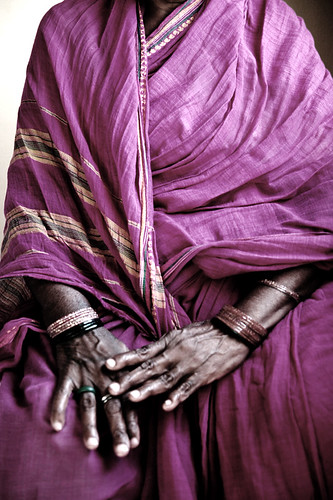
Radha grew up in a small village and was married off at a young age. Soon after her marriage, her husband began to beat her. In her despair, she confessed to a male acquaintance that she wanted to get away from her situation. The man asked her if she wanted to leave with him and she said yes. What happened next is not entirely clear, but she believes the man slipped a pill in her drink and she passed out. When she woke up she did not recognize her surroundings. She was later told she was in Mumbai. At the time she thinks she was only 10 or 12 and already pregnant with her husband’s child. A boy. Years passed. She did not want to tell us about this period of her life. Her son grew up and married, having two daughters of his own. While he was alive, he provided for her. Later, her son passed away leaving her with two grandchildren and a daughter-in-law. With no other family to care for her, she faced a new life of terrible hardship.
With no other options for survival, she started working in the red light district. Her grandchildren played in the streets when she took customers to a room.
Vera met them and began to ask questions about their situation. After a while, she invited the children to come live at her home. Radha is able to visit them occasionally. She reports, “Vera is good and takes care of my grandchildren.”
It may seem shocking to us, but she clearly doesn’t know her true age. She guessed that she may be 45 or so; but decades of life in extreme poverty have not been kind. As an older woman, her earning power as a prostitute fell rapidly and she turned to the owners of the house/brothel requesting money for cleaning and taking care of the house. We asked if there was anything she wanted in her life, and she said that now that her arm and leg are better (she went through a period of bad health) nothing is important to her so long as she knows her grandchildren are safe. Despite her troubles, she maintains a positive attitude. Radha said, “In my life, it is said that I should be sad, but instead I laugh.”
Marchina giggled a lot when we talked to her; yet it was hard to tell if some of that energy came from nervousness. Regardless, she opened up to us and began to tell her story. She grew up in Kolkata. Still single at the age of 18, her neighbors kidnapped her and sold her to workers/a pimp in the red light district in Mumbai. She tried to leave several times after being beat by the house owner, but was powerless to escape. Finally, she enjoyed a short time of freedom staying with a friend, but since they were not related, she was only able to stay for a few months. After five years of living as a sex worker in Mumbai, she married a man and had two children. Her husband treated her very well and provided for her. However, when she went to the hospital to deliver her second child, her husband took all of her money, jewelry, and other possessions and left her. After two months, he returned; but Marchina refused to forgive him or allow back into her life.
After this episode, she started working in the red light again. During this time, a family “adopted her and her children” but this support was short-lived. They soon were not able to care for her anymore so she had to resume sex work again. After a while, she met a man who now lives with her and takes care of her children. He takes them out to play and treats her well, but she refuses to marry him because of her ordeal with the first husband. Marchina wants to leave the district. She says she would be happy if she “could take her children out of the area and clean houses” to make money.
When Vera started her home, she searched the streets for the ladies’ children. She met Marchina’s children. They accepted an invitation to visit the home for 10 days and loved it. Now Marchina is extremely grateful to her. She says, “Vera loves my children so much.” The girls are now twenty and fifteen. The youngest is still allowed to live at the children’s home, but the oldest has to decide whether to continue living in another home with the nuns until she is married or find another path for her life.
After our first encounters with some of the women, Melody, Stephanie, Jardena, and David decided to walk through the red light on their own. Without Karan escorting the group, they received much more attention. Men called out in Hindi, other’s cried out hellos, and child after child ran up to them to shake their hands and ask for money. Later, as they stopped to examine a clothing and fabric shop, David saw a large group of sex workers run for cover when a signal alerted them that police patrol was approaching. They disappeared into the buildings and alleyways. The patrol passed. The women reclaimed their positions.
Over the next few days, there were many opportunities to spend time with Vera, her partners, and the women. The girls met with the ladies and the nuns for lunch. It was more of an introduction to the women, hoping to build trust in our motivations, and to get to know us better. Unfortunately, we lacked translation for most of the time and not much happened other than eating and smiling at each other; yet one of the ladies invited Melody and Stephanie to their home the next day.
... an excerpt from our book: 30 Days

Radha grew up in a small village and was married off at a young age. Soon after her marriage, her husband began to beat her. In her despair, she confessed to a male acquaintance that she wanted to get away from her situation. The man asked her if she wanted to leave with him and she said yes. What happened next is not entirely clear, but she believes the man slipped a pill in her drink and she passed out. When she woke up she did not recognize her surroundings. She was later told she was in Mumbai. At the time she thinks she was only 10 or 12 and already pregnant with her husband’s child. A boy. Years passed. She did not want to tell us about this period of her life. Her son grew up and married, having two daughters of his own. While he was alive, he provided for her. Later, her son passed away leaving her with two grandchildren and a daughter-in-law. With no other family to care for her, she faced a new life of terrible hardship.
With no other options for survival, she started working in the red light district. Her grandchildren played in the streets when she took customers to a room.
Vera met them and began to ask questions about their situation. After a while, she invited the children to come live at her home. Radha is able to visit them occasionally. She reports, “Vera is good and takes care of my grandchildren.”
It may seem shocking to us, but she clearly doesn’t know her true age. She guessed that she may be 45 or so; but decades of life in extreme poverty have not been kind. As an older woman, her earning power as a prostitute fell rapidly and she turned to the owners of the house/brothel requesting money for cleaning and taking care of the house. We asked if there was anything she wanted in her life, and she said that now that her arm and leg are better (she went through a period of bad health) nothing is important to her so long as she knows her grandchildren are safe. Despite her troubles, she maintains a positive attitude. Radha said, “In my life, it is said that I should be sad, but instead I laugh.”
Marchina giggled a lot when we talked to her; yet it was hard to tell if some of that energy came from nervousness. Regardless, she opened up to us and began to tell her story. She grew up in Kolkata. Still single at the age of 18, her neighbors kidnapped her and sold her to workers/a pimp in the red light district in Mumbai. She tried to leave several times after being beat by the house owner, but was powerless to escape. Finally, she enjoyed a short time of freedom staying with a friend, but since they were not related, she was only able to stay for a few months. After five years of living as a sex worker in Mumbai, she married a man and had two children. Her husband treated her very well and provided for her. However, when she went to the hospital to deliver her second child, her husband took all of her money, jewelry, and other possessions and left her. After two months, he returned; but Marchina refused to forgive him or allow back into her life.
After this episode, she started working in the red light again. During this time, a family “adopted her and her children” but this support was short-lived. They soon were not able to care for her anymore so she had to resume sex work again. After a while, she met a man who now lives with her and takes care of her children. He takes them out to play and treats her well, but she refuses to marry him because of her ordeal with the first husband. Marchina wants to leave the district. She says she would be happy if she “could take her children out of the area and clean houses” to make money.
When Vera started her home, she searched the streets for the ladies’ children. She met Marchina’s children. They accepted an invitation to visit the home for 10 days and loved it. Now Marchina is extremely grateful to her. She says, “Vera loves my children so much.” The girls are now twenty and fifteen. The youngest is still allowed to live at the children’s home, but the oldest has to decide whether to continue living in another home with the nuns until she is married or find another path for her life.
After our first encounters with some of the women, Melody, Stephanie, Jardena, and David decided to walk through the red light on their own. Without Karan escorting the group, they received much more attention. Men called out in Hindi, other’s cried out hellos, and child after child ran up to them to shake their hands and ask for money. Later, as they stopped to examine a clothing and fabric shop, David saw a large group of sex workers run for cover when a signal alerted them that police patrol was approaching. They disappeared into the buildings and alleyways. The patrol passed. The women reclaimed their positions.
Over the next few days, there were many opportunities to spend time with Vera, her partners, and the women. The girls met with the ladies and the nuns for lunch. It was more of an introduction to the women, hoping to build trust in our motivations, and to get to know us better. Unfortunately, we lacked translation for most of the time and not much happened other than eating and smiling at each other; yet one of the ladies invited Melody and Stephanie to their home the next day.
... an excerpt from our book: 30 Days
India [a photo essay] - Day 7-9
The guys were waiting for us back at the hotel. As we met with the team, an uncomfortable silence came over the guys. David then informed us that Annie, the woman we were with then entire day, was the madam of her brothel. In other words, she is the one who runs the house, buys the girls, and rents the rooms. I didn't know how to respond to that. Vera told the guys that there was nothing to worry about, she had known Annie for years. But how could this visibly smart, gentle woman be a brothel keeper?
I'm glad she wanted to be our friend :)
The next day, me and the girls went to the market again. I love open streets of booth after booth of locals selling their craft.

One day I would love to have a store that sells food in bulk from local farmers. I want the grain, coffee, teas, rice, and all other cooking items displayed in jars. My goal is to have an environmentally friendly shop, where shoppers bring their re-usable bags to fill up with their ingredients for the week.
DOWN WITH PLASTIC!
Recommended reading for the month:
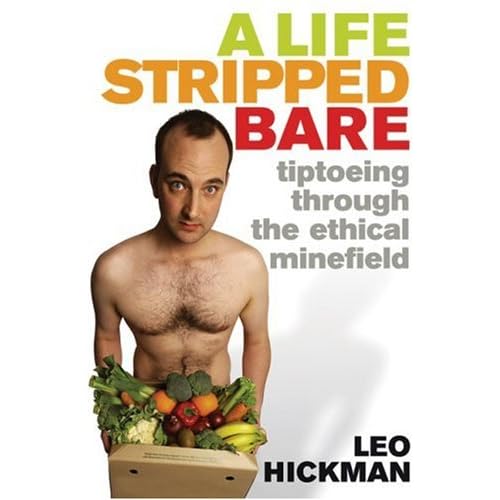
and

So back to my story...
The following days contained tons of sitting, waiting, and praying.
We had only so many chances to meet with Vera since she lived an hour away. We wanted to do all the we could within the time we had there to ensure that we help these women and their daughters to get out of prostitution
Finally, on the 8th day, Melody, Jardena, and I got a chance to travel across the city to the nun's home. There we 3 nuns who hosted a home for over 30 girls. They are children and young women all rescued from the red light district. In the home they are taught things like sewing, jewelry making, english, and your other basic education.
We talked with the head nuns and shared our aspirations for the new Rahab project: a second-hand store in the center of Mumbai. It was so great to see them take us (a few young YWAMers) seriously. We laid out a business plan. Told them what they should expect from us. What e expect from them. What we see Vera needed as far as finances and workers. And finally, how we can help.
This really got the ball rolling on everything and Rahab Project TWO emerged! The book which is set to be released early next year will hold all information about the women, about Vera, and about how you [the reader] can help practically in making this happen!
I'm hoping to return to Mumbai next year to help with the construction and design of the store.
Rahab has already rescued 4 young women from prostitution in less than a year and we hope to keep that number growing!!
I'm glad she wanted to be our friend :)
The next day, me and the girls went to the market again. I love open streets of booth after booth of locals selling their craft.

One day I would love to have a store that sells food in bulk from local farmers. I want the grain, coffee, teas, rice, and all other cooking items displayed in jars. My goal is to have an environmentally friendly shop, where shoppers bring their re-usable bags to fill up with their ingredients for the week.
DOWN WITH PLASTIC!
Recommended reading for the month:

and

So back to my story...
The following days contained tons of sitting, waiting, and praying.
We had only so many chances to meet with Vera since she lived an hour away. We wanted to do all the we could within the time we had there to ensure that we help these women and their daughters to get out of prostitution
Finally, on the 8th day, Melody, Jardena, and I got a chance to travel across the city to the nun's home. There we 3 nuns who hosted a home for over 30 girls. They are children and young women all rescued from the red light district. In the home they are taught things like sewing, jewelry making, english, and your other basic education.
We talked with the head nuns and shared our aspirations for the new Rahab project: a second-hand store in the center of Mumbai. It was so great to see them take us (a few young YWAMers) seriously. We laid out a business plan. Told them what they should expect from us. What e expect from them. What we see Vera needed as far as finances and workers. And finally, how we can help.
This really got the ball rolling on everything and Rahab Project TWO emerged! The book which is set to be released early next year will hold all information about the women, about Vera, and about how you [the reader] can help practically in making this happen!
I'm hoping to return to Mumbai next year to help with the construction and design of the store.
Rahab has already rescued 4 young women from prostitution in less than a year and we hope to keep that number growing!!
Wednesday, November 18, 2009
Logos!
Sorry, I have to take a break from the stories for a bit. I've been working non-stop on designs for the book!! It's so close to completion... we just need a few more sections finalized.
I'm excited to see this in print!!!

a few logo ideas


I'm excited to see this in print!!!

a few logo ideas


Wednesday, November 11, 2009
India [a photo essay] - Day 6
Melody and I met our translators at the mall that afternoon greatly anticipating our day out with Annie. We arrived to her home and was warmly greeted by some of the women who lived and worked with her. We sat down in the first room. It was small. About 8 feet by 8 feet (at most) but was a shared space for guests, hanging our, and evidently dinning. Two sisters sat in the floor in front of us eating chipati and other Indian cuisine. We chatted a bit about their lives. They both ended up in the brothel for the same reasons. Both were once married, but their husband’s beat them. Leaving home and all they knew, they lived on the streets and about starved to death. Not wanting it to be the end, they both chose prostitution to survive. Storied just like this are heard all throughout the red light. It’s hard to understand why anywhere on earth would allow a woman to sell her body in order to stay alive. But it’s happening and it’s more common than we know.
Finally Annie arrived, excited to take us out, she hailed a cab right outside her door. Melody and I jumped in quickly realizing out translator was not going with us. We had the entire day to spend with this woman who we barely knew, but had no chance to communicate properly to her. Off we went…
The first stop was at a fork in the road in a very nice part of town. The alley way to our right looked like it came right out of Italy. We got out and walked down the huge stairs to a man-made water hole. I was surrounded with concrete steps as if it were the center of an arena. She stopped and asked a man at the top of the steps who was napping a few questions. Then we headed to the water where she took a sip. And then off we were again, up the stairs, and into the cab.
We stopped at the hanging garden, “not because they hang people here” we were told by a boy selling souvenirs. It was beautiful. The sun was so bright, but bearable because of all the smog. It was a sad sight to see most of the grass withered away from the dry season.
Walkway of the Hanging Garden
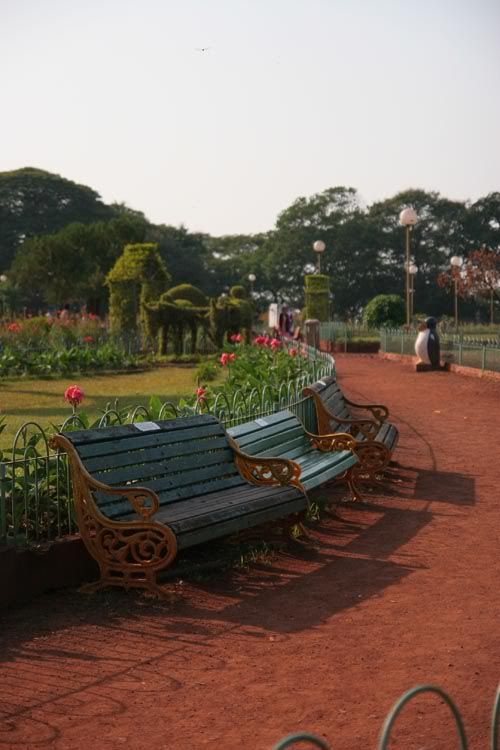
We walked for about an hour when I realized we were getting starred at more than usual. I wondered to myself if the people passing by recognized or knew who she was. I felt so responsible for her situation. Such a gentle but strong woman living a way of life no one would ever choose.
Annie and a souvenir we picked up
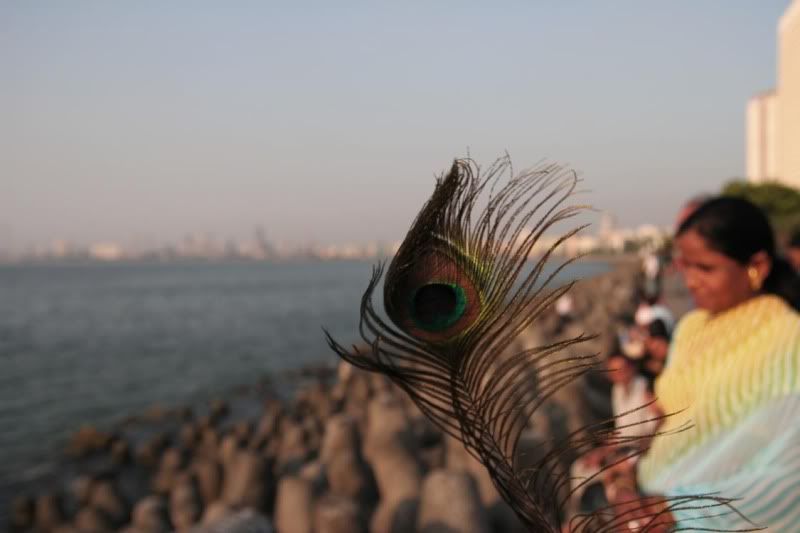
the sun set over the Mumbai cityscape
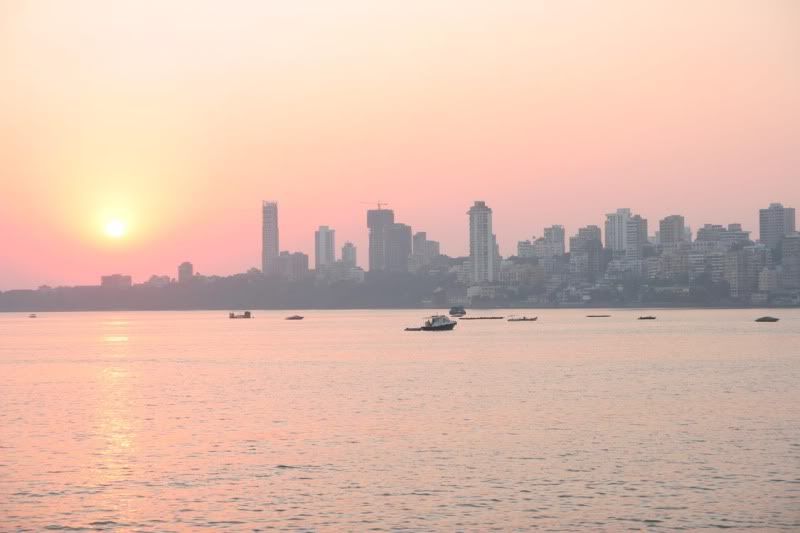
We then walked about 3 miles along the boardwalk of the beach. More of a painful stroll, but I made it. We finally made it back to her place, but it was getting late and she had better things to do at this time of day. We met up with Marchina and they walked Melody and I to the City Centre. The day was lovely and I don’t think I regret not taking any photos at her home.
Finally Annie arrived, excited to take us out, she hailed a cab right outside her door. Melody and I jumped in quickly realizing out translator was not going with us. We had the entire day to spend with this woman who we barely knew, but had no chance to communicate properly to her. Off we went…
The first stop was at a fork in the road in a very nice part of town. The alley way to our right looked like it came right out of Italy. We got out and walked down the huge stairs to a man-made water hole. I was surrounded with concrete steps as if it were the center of an arena. She stopped and asked a man at the top of the steps who was napping a few questions. Then we headed to the water where she took a sip. And then off we were again, up the stairs, and into the cab.
We stopped at the hanging garden, “not because they hang people here” we were told by a boy selling souvenirs. It was beautiful. The sun was so bright, but bearable because of all the smog. It was a sad sight to see most of the grass withered away from the dry season.
Walkway of the Hanging Garden

We walked for about an hour when I realized we were getting starred at more than usual. I wondered to myself if the people passing by recognized or knew who she was. I felt so responsible for her situation. Such a gentle but strong woman living a way of life no one would ever choose.
Annie and a souvenir we picked up

the sun set over the Mumbai cityscape

We then walked about 3 miles along the boardwalk of the beach. More of a painful stroll, but I made it. We finally made it back to her place, but it was getting late and she had better things to do at this time of day. We met up with Marchina and they walked Melody and I to the City Centre. The day was lovely and I don’t think I regret not taking any photos at her home.
Saturday, November 7, 2009
India [a photo essay] - Day 5
We finally got the chance to hang out with all the women. Vera invited a huge group to meet us at the mall for a big late lunch. We were expecting about 5 but as we waited we realized more and more were coming. I think the total ended up to be about 20 of us. The restaurant was super fancy. Only the best for these woman I thought. The waiters seated us in the huge chair fit for a king, then poured our water for us. They brought us this weird green concoction with what looked like eggs in it. It looked like green bubble tea but with spices in it. We all looked around hoping someone would know what it was. I dared one of the ladies in front of me to try some but she wasn't brave enough. I took a sip and tasted not at all what I expected to taste. It was super spicy and the "eggs" where bread crumbs I think. A few of the women followed my dare, but no one took more than a sip.
After sitting in awkward silence for what seemed like eternity, the food came. And kept coming. We all had one HUGE plated full of chipati, crunchy tortillas, spicy okra, dal, tons of chicken, and of course rice. The plate was more like a serving tray full of spicy food... all for about $2.50.
By the end of the meal we were anxious to hear if any of the women would allow us to come to their homes. One in particular (we'll call her Anni for identity sake) wanted all the girls to come back to hang out. But that wouldn't be suck a wise idea, so we decided that 2 coming over the next day would be better.
Melody and I were excited. This was pretty much what we came here for. Anni invited us to go to the beach and see a few sights throughout the city.
It was a good meal.
After sitting in awkward silence for what seemed like eternity, the food came. And kept coming. We all had one HUGE plated full of chipati, crunchy tortillas, spicy okra, dal, tons of chicken, and of course rice. The plate was more like a serving tray full of spicy food... all for about $2.50.
By the end of the meal we were anxious to hear if any of the women would allow us to come to their homes. One in particular (we'll call her Anni for identity sake) wanted all the girls to come back to hang out. But that wouldn't be suck a wise idea, so we decided that 2 coming over the next day would be better.
Melody and I were excited. This was pretty much what we came here for. Anni invited us to go to the beach and see a few sights throughout the city.
It was a good meal.
Wednesday, November 4, 2009
India [a photo essay] - Day 4
Disheartening facts came to the team before we left for this trip. It was when realized just what we were getting ourselves into. We learned stagering statistics like: There are 300,000 TO 500,000 girl children are in commercial sex & organized prostitution. And that Mumbai alone is the home to 100,000 sex workers, the largest sex industry centre in Asia.
Our main purpose of this outreach was to work with a woman named Vera. Her story in itself is very inspiring. She is originally from Mumbai (actually grew up just one street over from the red light district). Her family left Mumbai when she was about 22. They came to America where Vera receive her college degree in Micro Biology. Soon after she turned to the mission field joining the ranks of YWAMers all over the world. She became good friends with our base leader here in Germany, Jan, who is also a photographer and has a huge passion for work in the red light. Through him she found out about the area new her childhood home. She was in disbelief. After visiting it herself, she decided that something had to change. She is now the project Manager in Mumbai running a childrens home for 9 girls from the red light area. They are all daughters or orphans of mothers in prostitution.
We got the chance to hang out with the girls at the mall and took them to see G-Force. Yes, a movie about talking, crime fighting guinea pigs. It was great. The girls all have such amazing personalities, full of life and of hope.
Our team has since committed to working with Vera long term to see to it that these girls do not have to return to lived in the light. Our other hope is to see their mothers get out of the work they are in.
We spent a few days throughout the weeks discussing business plans and ideas to get these women jobs and a support group to help them spiritually as well as emotionally. At the moment, it looks like we are going to be able to start receiving funds to start a second-hand shop for the women the work in. Thrift stores are a new concept in India and when we introduced the idea to several nuns working along side our team, they were quite excited. Vera also has tons of open doors with students at local universities who want to help in any way they can.
I will definitely have more updates on this project as it comes in!
Oh, and I took up jewelery making! The girls have a teacher that come inonce a week to train them in making amaaazing pieces.
I was inspired...
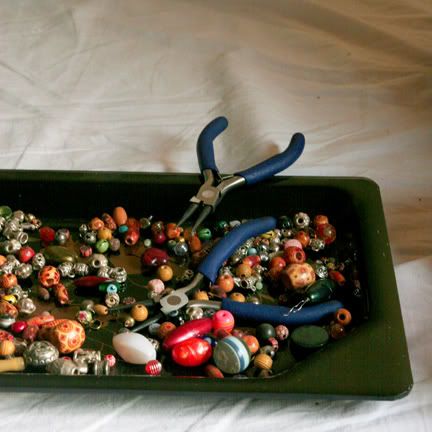
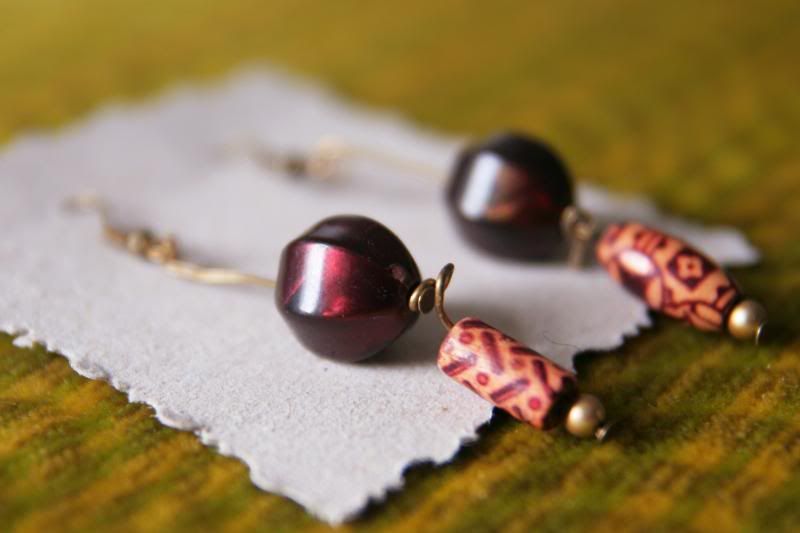
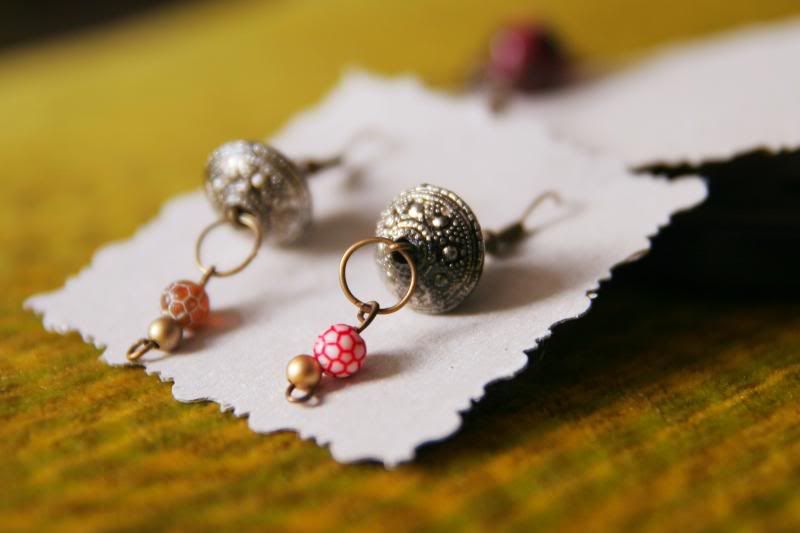
and my favorite
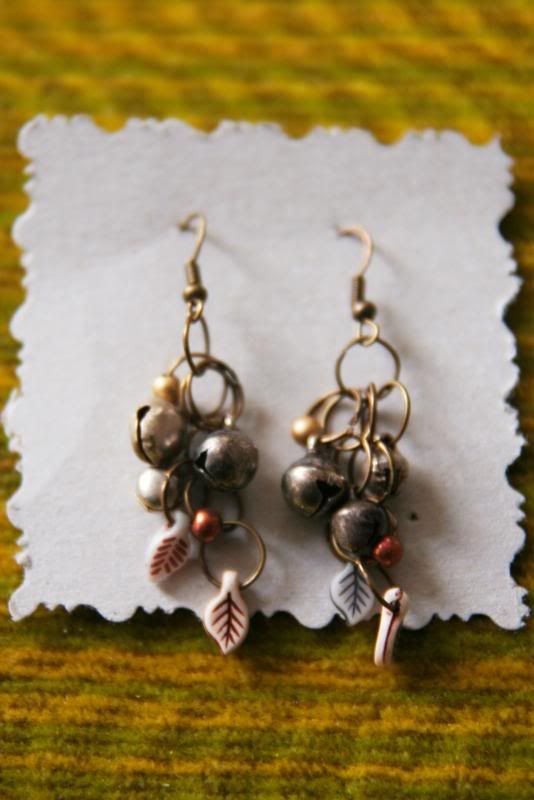
But thankfully the girls creations are better than mine :)
to see some of their work, go to isanctuary.org
Our main purpose of this outreach was to work with a woman named Vera. Her story in itself is very inspiring. She is originally from Mumbai (actually grew up just one street over from the red light district). Her family left Mumbai when she was about 22. They came to America where Vera receive her college degree in Micro Biology. Soon after she turned to the mission field joining the ranks of YWAMers all over the world. She became good friends with our base leader here in Germany, Jan, who is also a photographer and has a huge passion for work in the red light. Through him she found out about the area new her childhood home. She was in disbelief. After visiting it herself, she decided that something had to change. She is now the project Manager in Mumbai running a childrens home for 9 girls from the red light area. They are all daughters or orphans of mothers in prostitution.
We got the chance to hang out with the girls at the mall and took them to see G-Force. Yes, a movie about talking, crime fighting guinea pigs. It was great. The girls all have such amazing personalities, full of life and of hope.
Our team has since committed to working with Vera long term to see to it that these girls do not have to return to lived in the light. Our other hope is to see their mothers get out of the work they are in.
We spent a few days throughout the weeks discussing business plans and ideas to get these women jobs and a support group to help them spiritually as well as emotionally. At the moment, it looks like we are going to be able to start receiving funds to start a second-hand shop for the women the work in. Thrift stores are a new concept in India and when we introduced the idea to several nuns working along side our team, they were quite excited. Vera also has tons of open doors with students at local universities who want to help in any way they can.
I will definitely have more updates on this project as it comes in!
Oh, and I took up jewelery making! The girls have a teacher that come inonce a week to train them in making amaaazing pieces.
I was inspired...



and my favorite

But thankfully the girls creations are better than mine :)
to see some of their work, go to isanctuary.org
India [a photo essay] - Day 3
David, Melody, and I decided to explore more of the area while Jardena, Inka, and Uli went to the Children's home with Vera.
We walked, and walked, and walked. We walked over a bridge and I noticed everyone covering there face. I thought It must just be more pollution from the streets below until I saw them. The crows. Dozens of them. The were scavenging above a fish market and boy did that smell wreak. I guess they still haven't discovered refrigeration or ice for seafood. It was an impressing sight non-the-less. Somehow two older women napped on the ledge where shrimp was pealed daily. They must have lost their sense of smell throughout the years of working.
Another woman sat peeling shrimp getting orders from boss man while crows looked down from up above
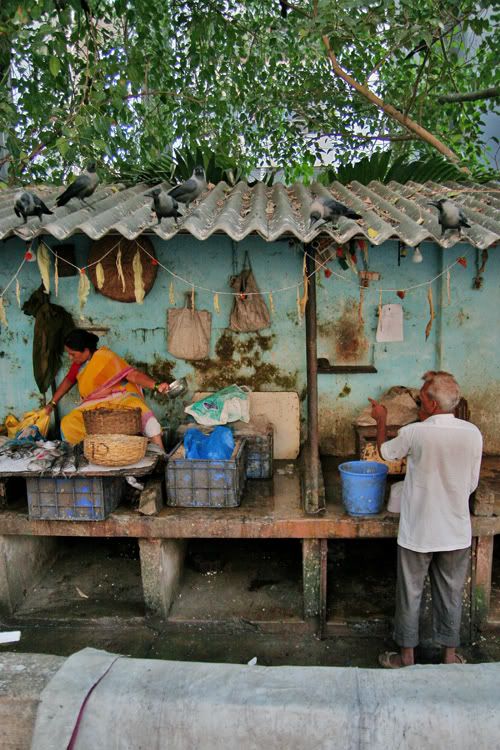
As we walked past the shops I saw a man covered in concrete ashes and asked him for a picture. He actually posed for me for a minute or two.
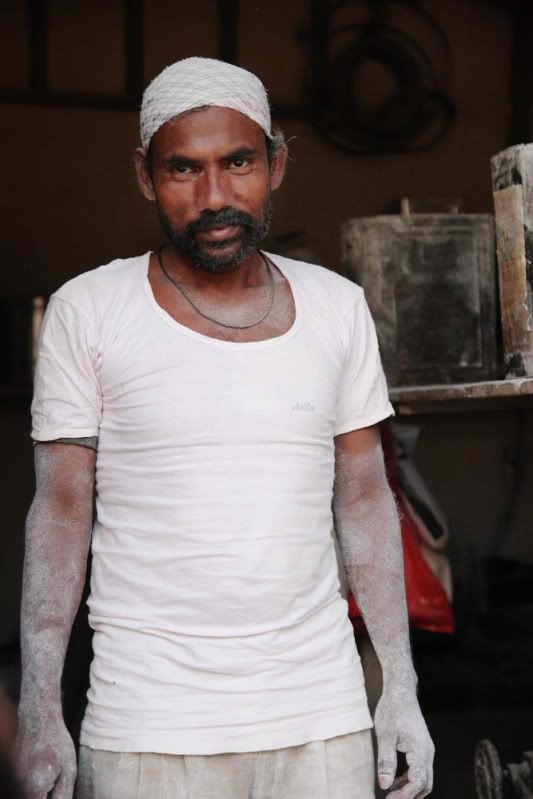
Thanks concrete man :)
Like everywhere else in Inia, the streets are jammed packed with taxis and bicycles. We stopped at one shop on this corner where the owner took particular interest in Melody's camera. She had with her a roleflex and somehow this man knew all about aperture, medium format film, and vintage cameras. He expressed his frustration of not being able to find 120 film in this city...
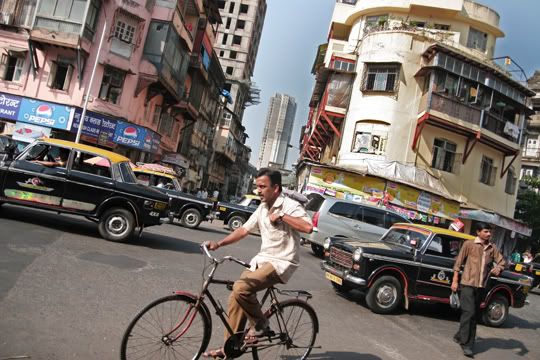
Our stroll ended at the site of this Buddhist monk
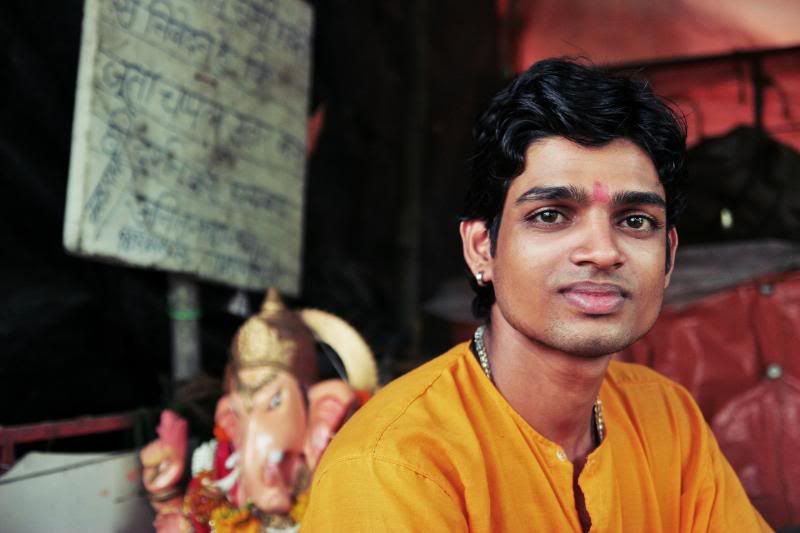
He seemed quite young to me, but as we chatted with him, several men came up to be blessed in ceremony as he went through the steps: tying some sort of leaves together on a string with fruit attached, dipping them in some sort of paint and saying a "prayer" over the men, then giving them the mark on their forehead of the third eye or "chakra". He had never met a Christian... until today.
We walked, and walked, and walked. We walked over a bridge and I noticed everyone covering there face. I thought It must just be more pollution from the streets below until I saw them. The crows. Dozens of them. The were scavenging above a fish market and boy did that smell wreak. I guess they still haven't discovered refrigeration or ice for seafood. It was an impressing sight non-the-less. Somehow two older women napped on the ledge where shrimp was pealed daily. They must have lost their sense of smell throughout the years of working.
Another woman sat peeling shrimp getting orders from boss man while crows looked down from up above

As we walked past the shops I saw a man covered in concrete ashes and asked him for a picture. He actually posed for me for a minute or two.

Thanks concrete man :)
Like everywhere else in Inia, the streets are jammed packed with taxis and bicycles. We stopped at one shop on this corner where the owner took particular interest in Melody's camera. She had with her a roleflex and somehow this man knew all about aperture, medium format film, and vintage cameras. He expressed his frustration of not being able to find 120 film in this city...

Our stroll ended at the site of this Buddhist monk

He seemed quite young to me, but as we chatted with him, several men came up to be blessed in ceremony as he went through the steps: tying some sort of leaves together on a string with fruit attached, dipping them in some sort of paint and saying a "prayer" over the men, then giving them the mark on their forehead of the third eye or "chakra". He had never met a Christian... until today.
India [a photo essay] - Day 2
We met with Karan and learned about his ministry forStreet kids. Every Friday he meets with the boys to play cricket in the park and then hosts a small Bible study/devotional.
We played with the kids for a few hours (a few long hours that is... cricket is one of the slowest games I've ever experienced.) I finally got a chance to play (after asking since I wasn't originally picked for a team). It was my chance up to bat and I hit it on the first pitch. Unfortunately in cricket, if someone catches the ball, you're out. I was out.
As I sat in the grass, I talked to some of the kids, listened to Indian radio on a fake iPhone, had my camera stolen by a little boy/future photographer (it was returned don't worry), and then led a devotional with about 20 of the boys before they sang us their worship songs in Hindi.
The future photographer at bat

The boys singing worship
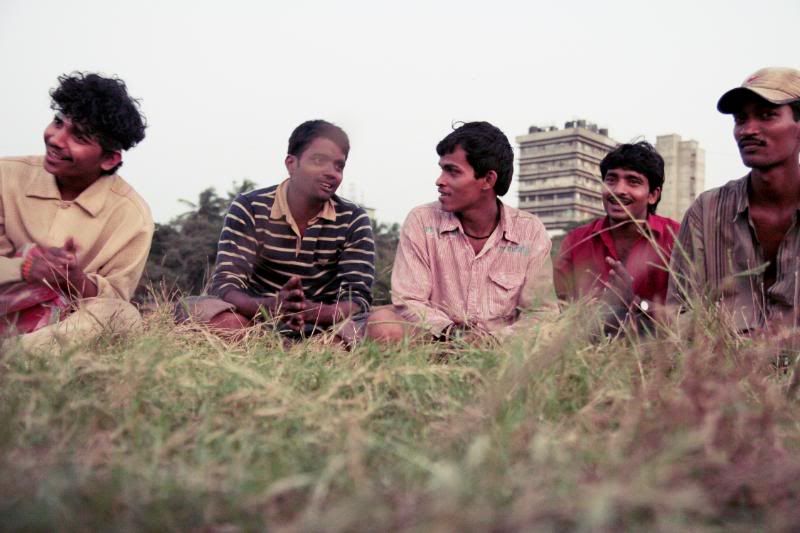
The group before we went to a restaurant near by for Pepsis
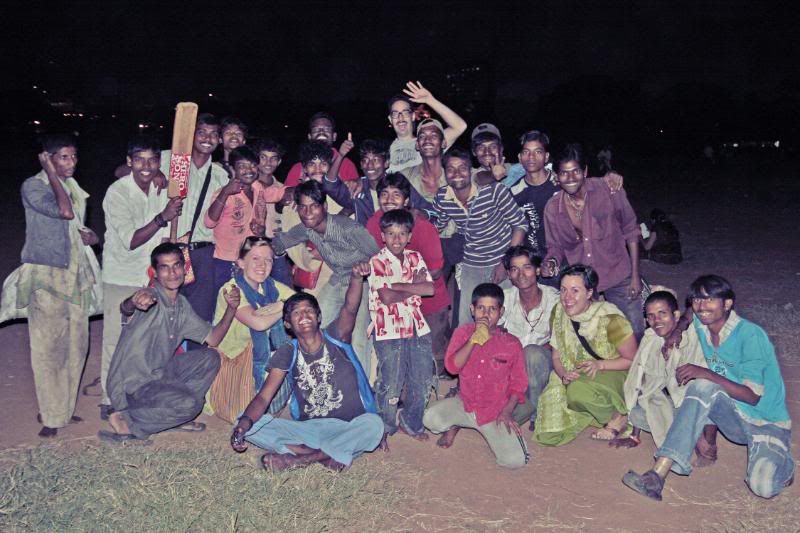
That night, Karan took David, Uli, and I to walk the red light district. The life there was so different than I expected. Every corner had a shop and there were kids playing everywhere. We stopped and talked to a group of them playing a game I had never seen before. It was sort of like bumper pool, but the rules were slightly different. They were excited for me to take pictures of them and the oldest two spoke English very well. It was sort of eerie in a way to know what was going on inside the walls around us with kids playing nonchalantly in the streets.
A red light
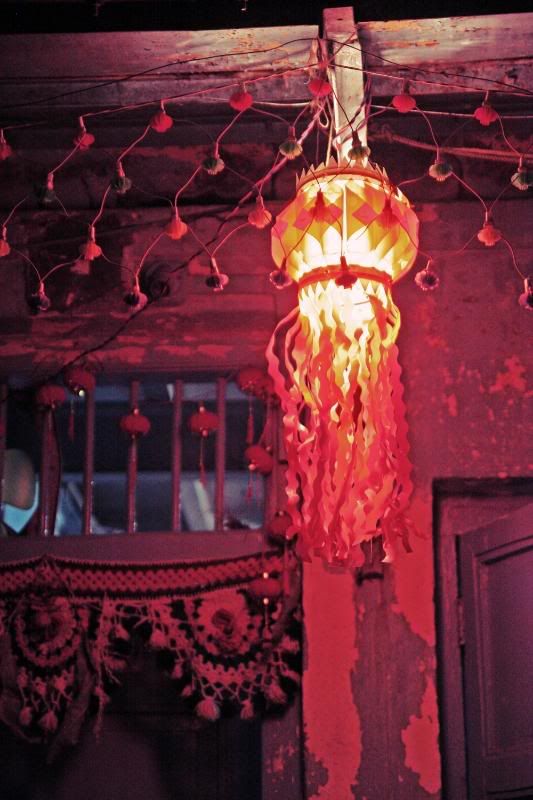
We played with the kids for a few hours (a few long hours that is... cricket is one of the slowest games I've ever experienced.) I finally got a chance to play (after asking since I wasn't originally picked for a team). It was my chance up to bat and I hit it on the first pitch. Unfortunately in cricket, if someone catches the ball, you're out. I was out.
As I sat in the grass, I talked to some of the kids, listened to Indian radio on a fake iPhone, had my camera stolen by a little boy/future photographer (it was returned don't worry), and then led a devotional with about 20 of the boys before they sang us their worship songs in Hindi.
The future photographer at bat

The boys singing worship

The group before we went to a restaurant near by for Pepsis

That night, Karan took David, Uli, and I to walk the red light district. The life there was so different than I expected. Every corner had a shop and there were kids playing everywhere. We stopped and talked to a group of them playing a game I had never seen before. It was sort of like bumper pool, but the rules were slightly different. They were excited for me to take pictures of them and the oldest two spoke English very well. It was sort of eerie in a way to know what was going on inside the walls around us with kids playing nonchalantly in the streets.
A red light

India [a photo essay] - Day 1
We arrived at the YMCA in Mumbai. We traveled all night and took a nap at about 8:30am after breakfast.
Our room
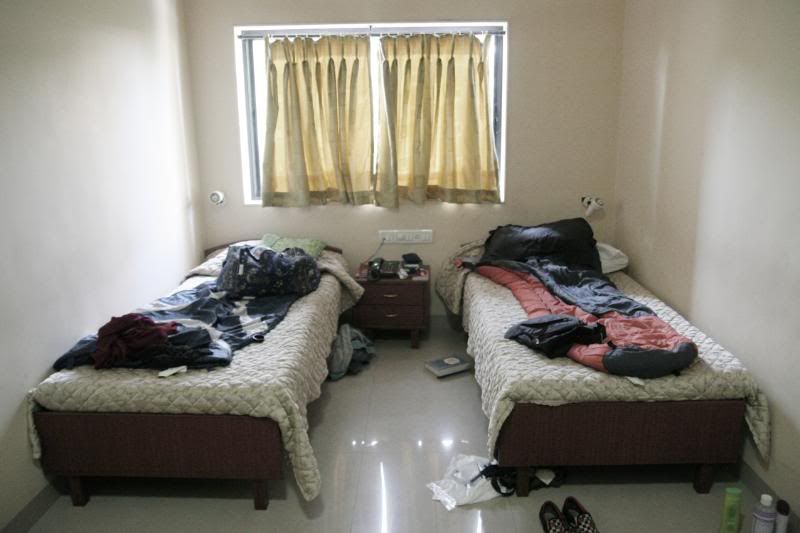
View from the hallway window
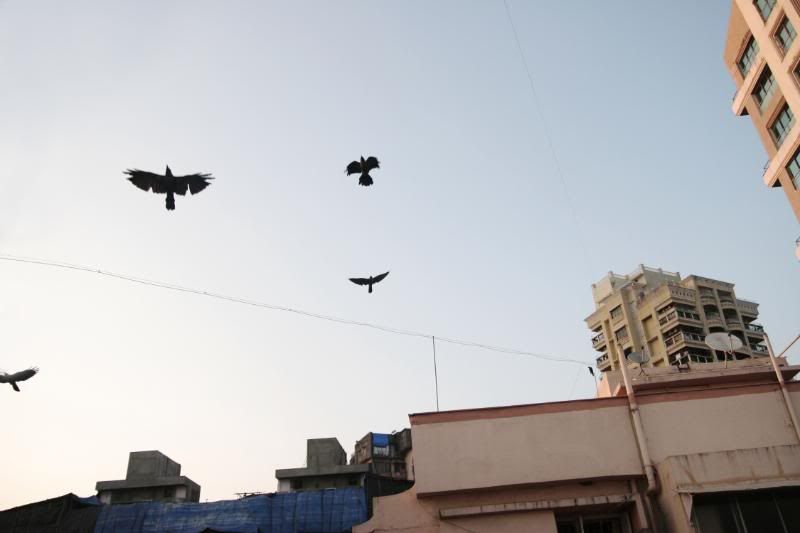
We met up with Vera and Ro(from Oregon) to explore the city and do some touristy things.
A typical everyday scene: Indian taxi ride

We went the the Gateway of India and became more of an attraction than the actual gate. Standing there for 10 minutes, we fell subject to about 15 kid's pictures.
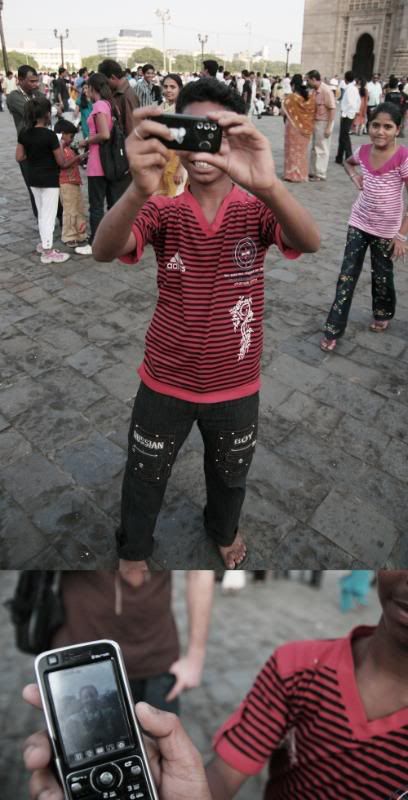
Our room

View from the hallway window

We met up with Vera and Ro(from Oregon) to explore the city and do some touristy things.
A typical everyday scene: Indian taxi ride

We went the the Gateway of India and became more of an attraction than the actual gate. Standing there for 10 minutes, we fell subject to about 15 kid's pictures.

Subscribe to:
Comments (Atom)
